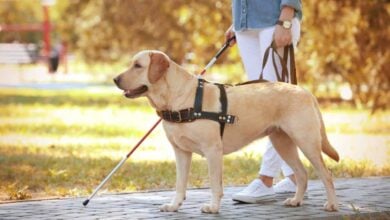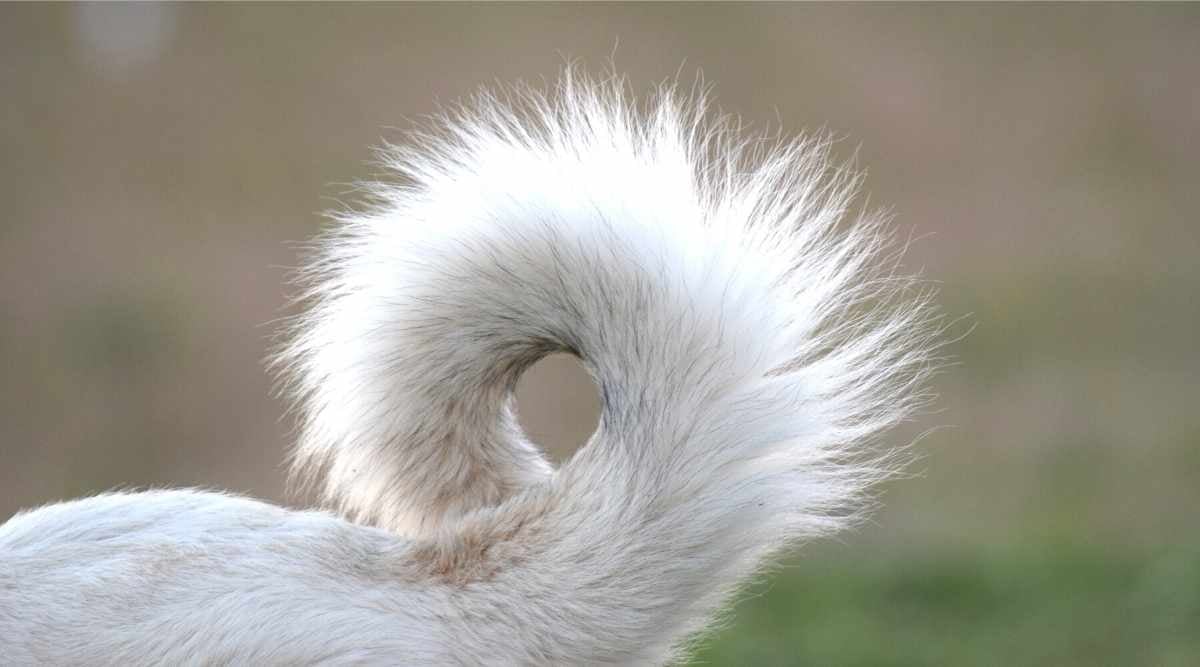Yorkshire Terrier Breed Information: Facts, Traits, Pictures & More
When you purchase through links on our site, we may earn a commission. Here’s how it works.
Yorkshire Terriers, or Yorkies as enthusiasts fondly know them, are members of the toy group and are one of the smallest dog breeds you can find. However, despite their tiny stature, the Yorkie is a terrier through and through. Do you not have much of a yard or live in an apartment? The Yorkshire Terrier could be a perfect fit for your lifestyle. The Yorkshire Terrier, commonly known as the Yorkie, is a spunky little dog with a personality that far outweighs its small stature. I’m excited to introduce you to the unforgettable Yorkie.
Table of Contents
Yorkie Breed History

The Yorkie is named for Yorkshire, England, where breeders developed them in the 19th century to catch rats in cotton and wool mills. The Yorkshire Terrier traces back to the Waterside Terrier, a breed formed by crossing the rough-coated Black-and-Tan English Terrier with the Paisley and Clydesdale Terriers. Weavers brought the developing breed to England when they emigrated from Scotland.
Although originally bred as a working dog, the Yorkie became a popular companion and show dog to families of European high society. The first dog to be recognized as a Yorkshire Terrier appeared in 1870.
It wasn’t long before these feisty little ratters became the favorite companions of fashionable ladies. By 1872, the Yorkie had crossed the pond to the U.S., where the breed quickly became the preferred choice of upper-class ladies of leisure as an early form of purse-dog.
Popular in the U.S. and England for decades, the breed hit a low point in the 1940s when smaller breeds lost popularity. But a Yorkie named Smoky, famous as a World War II soldier’s companion and war hero, renewed enthusiasm for the breed. Since then, the Yorkshire Terrier has remained one of America and the U.K.’s favorites.
The American Kennel Club (AKC) classifies Yorkshire Terriers in the Toy Group for their “diminutive size and winsome expressions.” This breed is formally recognized by the CKC, FCI, AKC, KC, UKC, KCGB, CKC, ANKC, NKC, NZKC, APRI, and ACR. In some countries, including the U.K., the Yorkie is traditionally shown on an individual box draped with a red cover. A show ring full of Yorkies displayed on their red boxes is really quite a remarkable sight.
A View Into The Yorkie (Video)
Check out this video to see the adorable Yorkshire Terrier in action and to learn more about this breed.
Yorkshire Terrier Temperament
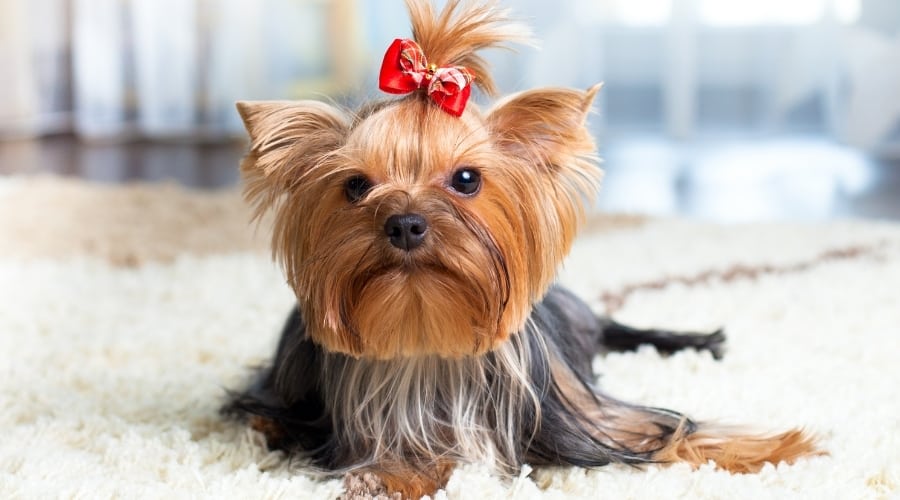
Despite their tiny statures, the Yorkshire Terrier is a vibrant little dog full of charisma. They don’t require a huge amount of exercise, but they love to play games at home with their favorite humans. A lot of that energy is down to their terrier blood. They have a high prey drive and will chase anything and everything in sight. Especially if it resembles a rodent.
Thankfully, they are also relatively chill in the home and are partial to an afternoon nap (or three). They are very affectionate and will happily sit on your lap all day long if you’re up for it. Their energy, combined with their easy-going nature, makes them well-balanced pups suited to most family lifestyles.
Talking of terrier blood, they have a streak of stubbornness, cheekiness, tenacity, and bossiness. If untrained, they can be a handful. But it is usually this feistiness that Yorkie lovers adore, and it is all a part of their canine charm.
This side of their personality makes them superb watchdogs. They’ll bark at everyone approaching their home or family, which is great if you’re looking for a canine alarm system. They have lots of energy and are similar in activity level to other toy breeds like the Pomeranian and Biewer Terrier.
Yorkies are very people-oriented and can become stressed if separated from their human pack for long periods. This separation anxiety means that they need a family who can spend most of their day with them. Otherwise, they’ll become very sad and withdrawn. Thankfully, this purse-sized pup can travel with you to most places you go.
Yorkshire Terrier Size & Appearance
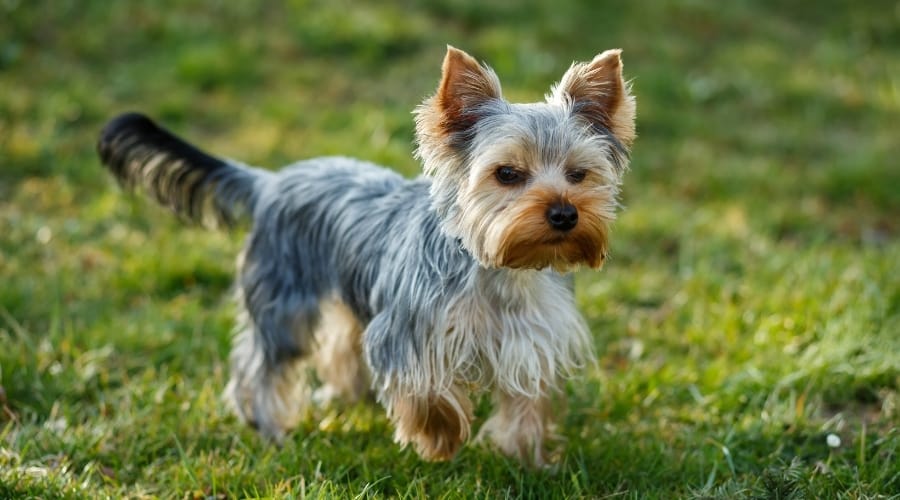
An adult Yorkshire Terrier grows to around seven to eight inches tall at the shoulder. They typically weigh in at four to seven pounds. This makes them one of the smallest dogs in the world. This is why many people love them so much. Males tend to be larger than their female counterparts.
The Yorkie has a neat, compact, and well-proportioned body. They hold their head high, giving them an aura of self-importance. Their button eyes are small, as are their dark noses. If you want to show your Yorkie in the conformation ring, your pup must conform to the Yorkie breed standard. And if you are just looking for a family pet, as long as they are healthy, you don’t need to worry about it.
The AKC and Canadian Kennel Club require the Yorkie’s tail to be docked to a medium length to compete in shows. Tail docking is still a common practice in the U.S., but it’s controversial in most areas of the world. Many countries, including Australia, Finland, Greece, Norway, and Sweden, ban tail docking.
Yorkie Coat & Colors
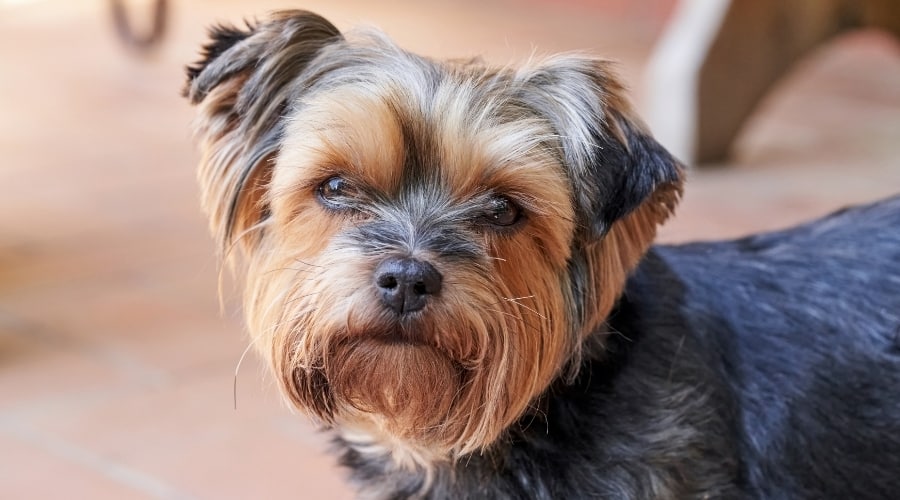
All Yorkshire Terriers are born with smooth, black coats with small tan points. As the dog matures, his coat turns the characteristic dark, steel blue, and tan of the breed. Some Yorkies remain black even in adulthood. Others can become very light and silvery-colored. These would be considered faults in show, but your dog’s color will have no bearing on his suitability as a pet and companion.
If you want to show your pup, they’ll need to stick with their long, natural coat. Their natural coat is so long that it falls to the floor, and the hair on their head needs to be tied up for them to see. It is silky, soft, and shiny, and they are regularly mistaken for the larger Silky Terrier. But for many family Yorkies, owners opt for a shorter, teddy bear coat that is easier to manage.
Yorkies do not have a fluffy undercoat to keep them warm as they are a single-coated breed. That means you’ll need to provide your pet with a jumper or coat during the winter months when you go out for walks. Needless to say, a Yorkie will not do well if kept outside in the cold.
Exercise Requirements
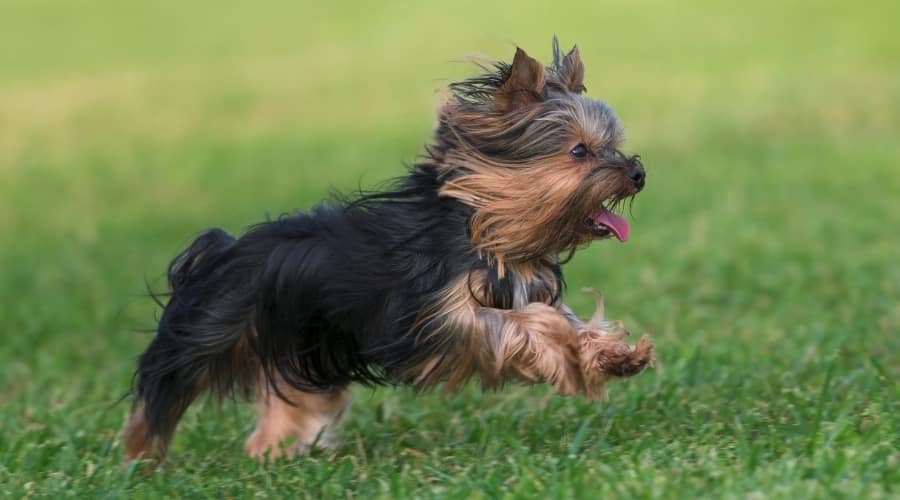
Although Yorkies are tiny, they still need at least 45 minutes of daily exercise to keep them fit and prevent them from becoming bored. An adult Yorkie will need two short walks each day. Alternatively, a few short playtime sessions in your backyard will suffice, preferably with toys we recommend for Yorkies. Their high prey drive means they love to run around and chase a ball, so be sure to play fetching games to keep them stimulated.
Despite their size, they also love to play with other dogs at the dog park. However, remember that your Yorkie is tiny and fragile. So you must stick to letting him play off-leash in the area reserved for small dogs and puppies. It’s great fun to watch your tiny pup try (and usually succeed) at bossing all the other dogs around.
Living Conditions For Your Yorkie
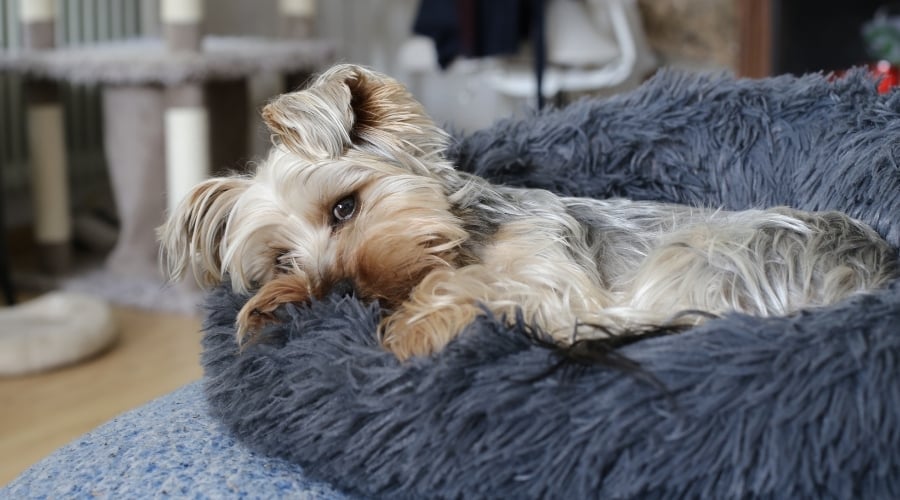
So, a Yorkie would make a great pet for a household without young children where there’s someone around during the day. However, they aren’t that tolerant of young, overzealous hands. So it’s important to train both children and dogs to respect and co-exist peacefully with each other. Young children often see small dogs as cuddly toys, so kids shouldn’t pick them up in case of an accident.
Other than their basic doggy needs, all these guys ask for is a loving family who can spend most of their day with them. They really hate to be left alone! As long as you give your Yorkie plenty of exercise and groom him frequently to keep his coat in excellent condition, your little buddy will love nothing more than to cuddle up on your lap at the end of the day.
Their tiny frame means they are suited to the smallest living spaces like apartments, but they’ll also thrive in large homes. Make sure you have a comfy bed suitable to their size. City dwellers and country folk alike are big fans of Yorkies. But, wherever you live, you must Yorkie-proof your pad and yard to prevent them from escaping. They will get through the tiniest gaps and slip through gates if they want to chase something.
Training Your Yorkshire Terrier
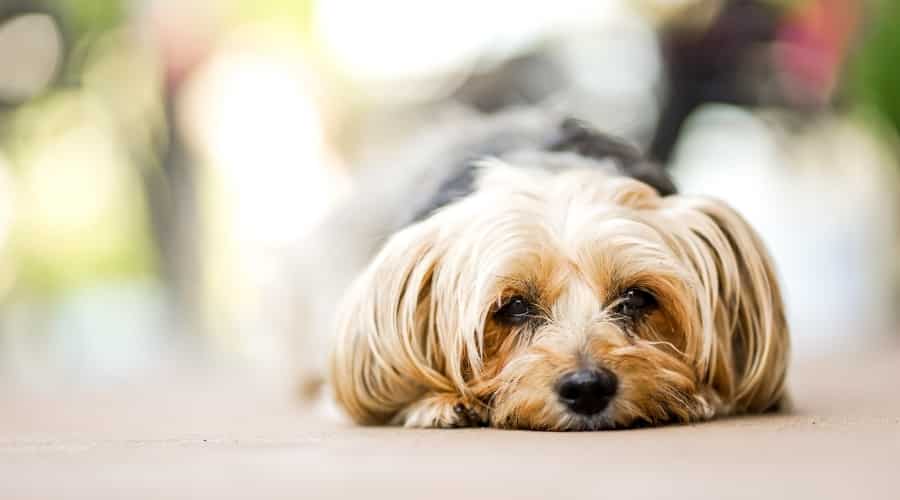
Yorkies are bright as buttons and very quick to learn. You’ll find housetraining your puppy is a breeze, as they cotton on to what’s required very rapidly. To overcome their potential stubborn streak, you need to start training early and make it fun. Otherwise, they’ll find something far more interesting to do.
Socializing your Yorkie pup is super important. Not only will it teach them the skills of doggy life, but it will build their confidence, too. In turn, this will prevent them from developing “small dog syndrome.” Don’t allow your small Yorkie to get away with naughty behaviors just because they are small.
Like other terrier breeds, the Yorkie can have an independent streak. Once on the scent of a prey animal, such as a squirrel or rat, you may have trouble getting your tiny terror to come back to you! When it comes to properly leash training your Yorkie, we recommend choosing a Yorkie-appropriate dog harness. This will ensure your pup doesn’t have any tracheal issues if they decide to pull. These pups are small, which means you’ll want to make walking as gentle as possible.
A crucial part of your Yorkie training will be crate training. Unfortunately, this pooch is one of the most susceptible to suffering from separation anxiety. And no matter how much you want to, you can’t be with them 24/7. So, for the times when you need to leave them, you’ll want to give them somewhere that will make them feel as comfortable as possible. Make sure you have the right crate for your Yorkie.
Yorkshire Terrier Health Concerns
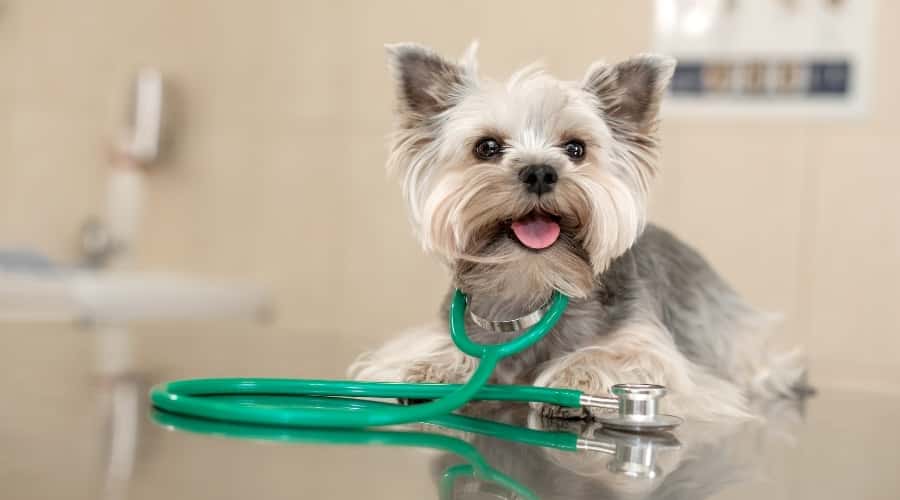
Like all purebreds, Yorkies aren’t immune to certain hereditary conditions and health problems. The most common concerns include retinal dysplasia, Legg-Calve-Perthes disease (thigh bone degeneration), luxating patella (kneecap dislocation), collapsed trachea, and portosystemic shunt (a liver condition).
The average lifespan of a healthy Yorkshire Terrier is between 13 and 16 years. Although some have been known to live up to 18 years. Although most Yorkies live long, healthy lives, there are a few conditions that are common to the breed, including:
- Collapsing trachea
- Luxating patella
- Dental problems
- Hypothyroidism
- Legg-Calvé-Perthes disease
- Low blood sugar (hypoglycemia)
- Bladder stones
- Cataracts
- Ingrown eyelashes
Yorkies are also prone to a liver defect called portosystemic shunt, which often requires expensive surgical treatment. A test is available for this condition, so it is worth asking your vet about putting your mind at rest.
Luxating Patella
Luxating patella is the medical name for dislocating knee caps. The condition is especially associated with Yorkies, so always ensure your puppy’s breeder has certification for both parents. These will state that they are clear of this congenital health problem.
Dental Problems
Because of their tiny mouths, Yorkies can be susceptible to issues with overcrowding or incorrect dental development. Also, little, crowded teeth can trap plaque, allowing tartar to form and canine periodontal disease to develop. You can prevent problems by brushing your Yorkie’s teeth every day. Use dog-specific toothpaste and a special mini toothbrush that you can get from your vet.
Legg-Calvé-Perthes Disease
Legg-Calvé-Perthes disease is a condition that causes poor blood supply to the head of the dog’s rear leg bones. Over time, that poor circulation causes the bone to degrade. The condition can be treated surgically. Again, ask your puppy’s breeder if the puppy’s parents have been screened for this congenital disease.
Best Pet Insurance For Yorkies
Choosing the best pet insurance for your Yorkie is a personal decision, but we recommend selecting a company based on coverage, customer service and reputation, claim repayment timeline, price, and available plan customizations.
| Best Overall | Best Value | Fastest Claim Processing | Best Multiple Pet Discount | Best Newcomer |
|---|---|---|---|---|
| Pets Best | Figo | Healthy Paws | Embrace | Lemonade |
| Read Review | Read Review | Read Review | Read Review | Read Review |
Fortunately for you, if you sign up for pet insurance before your Yorkie is diagnosed with new health conditions or suffers from an accident (post-waiting periods), it can help you cover the expenses.
We’ve selected the best pet insurance companies and evaluated them in our pet insurance reviews. Our article includes our top picks and reviews of the most popular pet insurance companies in the marketplace.
Pet Insurance Testimonial
Yorkshire Terrier: Lola
Pet Parent: Michael
Injury/Illness: Autoimmune disease
Fetch Reimbursement: $8,000
Fetch is the pet best insurance for your fur babies!!!! My wife and I have several dogs, including Lola, our precious 4-year-old Yorkie. Recently, she became quite ill from an autoimmune disease. One can imagine how sad we became to see our little bundle of joy go from running and barking in her yard to being immobile and unable to move. We took her to several doctors, and yes, the vet bills were quite expensive, nearly $8,500. But after all, Lola is family and our focus was making sure she got the best care. Needless to say, we found excellent doctors, and Lola is on the road to recovery. Fetch reimbursed us nearly $8,000 so far for her care. Lola will be on medication for the rest of her life, but my wife and I are grateful to Fetch for standing by us and enabling us to get the best treatment for our fur baby, Lola.
Nutrition
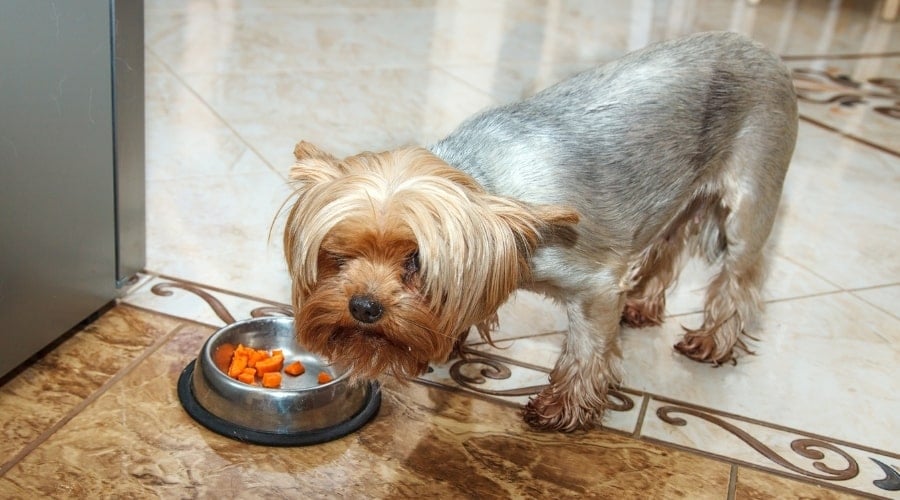
Yorkies don’t need special food to stay healthy. However, when choosing kibble, look for a brand that’s designed specifically for Yorkies or other small breeds. The pieces of kibble must be small enough to be manageable for your Yorkie’s tiny mouth and teeth. When you collect your puppy, ask the breeder what they recommend as an ideal food for your pup and stick to that, particularly for the first few weeks.
The average adult Yorkie will consume around one cup of kibble every day. This should be split into at least two different meal sittings. Always choose a high-quality food option because they will ensure that your Yorkie will get everything they need. Poor-quality or store-bought brands are rarely nutritionally balanced and are full of fillers and nasty preservatives.
Yorkie Grooming Needs
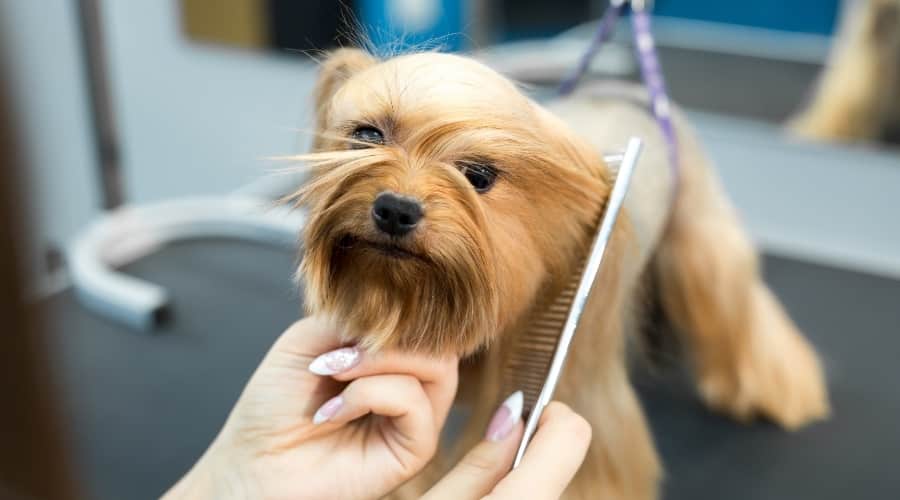
If you take on a Yorkie, you must be prepared to devote much time and energy to grooming and bathing him. The Yorkie’s natural coat should be long, straight, and silken. Amazingly, the Yorkie coat is very similar to human hair. And unlike other terriers, the coat will carry on growing right down to floor length if you don’t have it trimmed periodically. Natural coats need brushing every day and bathing every few weeks. Be sure to use a high‑quality shampoo tailored for Yorkies, check out our guide to the best shampoo for Yorkies to keep that silky coat in top condition.
Yorkies who pick a shorter hair-do will have a much easier time when it comes to grooming. Many opt for something known as a teddy bear cut which chops the hair down to around one inch long, and it follows the lines of their bodies (and also a popular Yorkie name). As a result, they will only need to be brushed several times a week and bathed once every eight weeks or so.
Yorkies have a single coat that does not shed frequently. That can make the breed suitable for people who have a dog allergy. Also, you won’t need to worry about cleaning up handfuls of shed fluffy undercoat! This is why they are also considered hypoallergenic.
You’ll need to take particular care of the hair around your Yorkie’s rear end. Because of their long hair, Yorkies often suffer from matting in this area, leading to the hair becoming clogged with feces. Aside from making the dog uncomfortable and sore, other more serious issues can arise, such as flystrike, which would mean a trip to the vet. You’ll also need to trim the hair inside your Yorkie’s ears to keep the ears from being weighed down.
Popular Breed Variations
There are a couple of popular breed variations with the Yorkshire Terrier. These don’t include hybrid breeds.
Parti Yorkie
The defining characteristic of the Parti Yorkie is its coat color. Parti Yorkies have the traditional coloring of black, tan, and white, but many different color combinations occur with this Yorkshire Terrier variation. Although the AKC has included the Parti classification since 2000, there’s still some debate among hardcore Yorkie breeders that the Parti shouldn’t be considered a true representation of the breed.
Teacup Yorkie
“Teacup” Yorkshire Terrier is a common term used to describe tiny adult Yorkshire Terriers (less than 4 pounds). The AKC and other kennel clubs don’t recognize the Teacup as a separate variety of the breed, and breeding practices for the “Teacup” are controversial and widely discouraged by responsible breeders. Health issues are a major concern with Teacups: the mother faces a great risk during pregnancy because she’s too small to give birth naturally, resulting in a high mortality rate. We have a dedicated breed guide for teacup Yorkies if you are interested in learning more about them.
Breeders & Puppy Costs

A good place to begin your search for a Yorkie puppy is on the website of the Yorkshire Terrier Club of America. Here, you’ll find many approved breeders who abide by the YTCA’s code of ethics. The code of ethics specifies that puppies may not be advertised before 12 weeks of age. Also, the code prevents the sale of puppies through pet stores and insists that breeders have the necessary health certifications for their breeding animals.
So, how do you spot a good breeder? There are a few red flags to be aware of when looking for a reputable breeder, especially online, including:
- Multiple litters on the premises
- Always having lots of puppies available
- Offering you the choice of any puppy
- Being offered the option to pay for the puppy with a credit card online
- Offering puppies at a discount price ‘without papers’
Never buy a puppy from a website that offers to ship the pup to you right away. That’s a common scam that frequently leaves buyers with a dog that isn’t what they expected. Always visit the breeder’s facility and ask to see the puppy’s parents and siblings. You could also ask your vet to recommend a reputable breeder.
Puppy mills are to be avoided at all costs when it comes to buying a pup. These mills are commercial enterprises run specifically to churn out as many puppies as possible as quickly and cheaply as possible. More often than not, the breeder has not had the puppies’ parents screened for genetic health conditions that could be passed on to their pups. Also, puppies from mills are frequently not wormed or vaccinated. And many are sold with diseases that may not be curable.
The cost of your Yorkie puppy will depend on where you live, the puppy’s parents’ show record, and the sex of the puppy. In general, Yorkie puppies can cost from around $500 up to $10,000 for a puppy with many champions in his bloodline. There are also ongoing lifetime costs to factor into your budget on top of the puppy costs. And remember, this could be for 11 to 15 years.
Rescue & Shelters
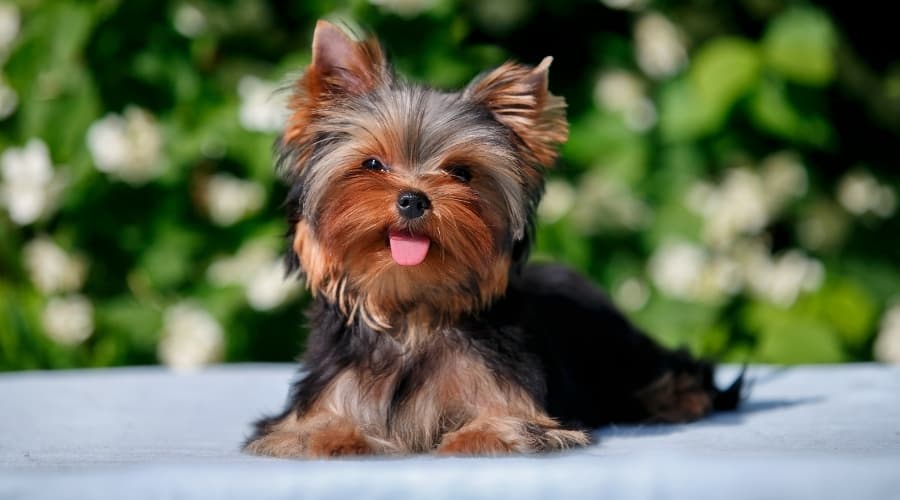
If you would prefer to give a forever home to an adult Yorkie, you might want to consider rehoming a dog from a shelter. You can start by checking the Yorkshire Terrier National, Inc. to see if any Yorkies need homes near you. The costs of rescuing a Yorkie are often much lower than buying a brand-new sparkly puppy from a breeder.
Of course, not every adult Yorkie from a rescue center comes with a full history. So, you could be taking a chance on your new dog’s behavior. Some rescue shelters will allow you to take a dog on a sort of ‘try before you buy’ foster program. This way, you can take a Yorkie home with you for a trial run before you have to commit to rehoming him.
Yorkshire Terrier Mixes
There are many different breeds these pups get mixed with, mostly because of their excellent demeanor. A few popular ones include the following:
- Chorkie – Chihuahua Yorkie mix
- Morkie – Maltese Yorkie mix
- Shorkie – Shih Tzu Yorkie mix
- Yorkipoo – Yorkie Poodle mix
Are You Ready For A Dog?
Yorkies are a wonderful breed, but despite their tiny size, they need extra special care. They require a lot of grooming, and extra small breeds like this are at constant risk of getting stepped on or sneaking away through the smallest openings. Before bringing a new Yorkie pup home, be sure you have the right setup for them and plenty of time to dedicate to your new fur baby. Learn more about how to be a responsible dog owner and what to expect in your puppy’s first year. We also cover the costs of a dog to help you determine if you are financially ready for a new pup.
Why Trust Canine Journal?
Danielle is a lifelong animal advocate and rescue pet parent. She has over thirty years of experience caring for dogs, including those with special medical and behavioral needs. Danielle has a particular passion for rescuing animals and has given several shelter pets a loving home. She is a dedicated researcher committed to providing up-to-date, accurate, and relevant information to help other pet parents give their dogs the best life possible.

